Author: Jen Holzer
Cairngorms LTSER
Israeli musicians Ehud Banai and the Refugees muse in the 1987 song, “Magic of the Galil”:
“…I imagined Scotland as Tavor Mountain
one dark night when I froze from cold
a guitar helped me
the fire helped me
the morning of renewing light helped me….”
While longing for landscapes of the Holy Land throughout the ages is incomparable, nostalgia of Israeli pop songs longing for landscapes abroad is also a noteworthy modern theme. As an Israeli researcher on my first trip to Scotland—in December 2016—I was inspired by the bucolic and rugged landscapes of Cairngorms National Park, but I was also unduly influenced by the brief daylight, and cold and grey of solstice in the Highlands. To the contrary, when I returned this June 2018 at peak daylength, sunny days seeming to brighten every interaction.
In December 2016, Dr. Jan Dick, a Scottish scientist based at the Center for Ecology and Hydrology, helped to coordinate an interview tour of Edinburgh, Aberdeen, Perth, and the Cairngorms National Park that would comprise a case study of the Cairngorms LTSER, part of a cross-platform study that also includes LTSER platforms in Romania and Spain. During that first visit, we conducted 23 in-depth stakeholder interviews in nine days.
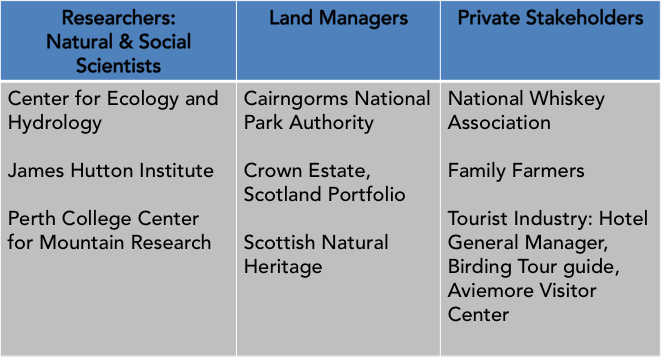
Cairngorms LTSER stakeholders interviewed in December 2016.
Credit: Jen Holzer
This June, I returned to present our findings, based on those interviews, about how the Cairngorms Long-Term Socio-Ecological Research (LTSER) platform is measuring up to its goals, as well as by comparing it to other LTSER platforms I had visited in Romania and Spain. Days were long and sunny, with Scots seeming to revel in the specialness of these bright but short-lived weeks on the calendar. While I had noticed the Scotch sociability and penchant for storytelling on my last visit, on this visit nearly everyone we met seemed to be taking the opportunity of our meeting to visit a special natural spot or go for a lunchtime jog on the grounds of a nearby estate.
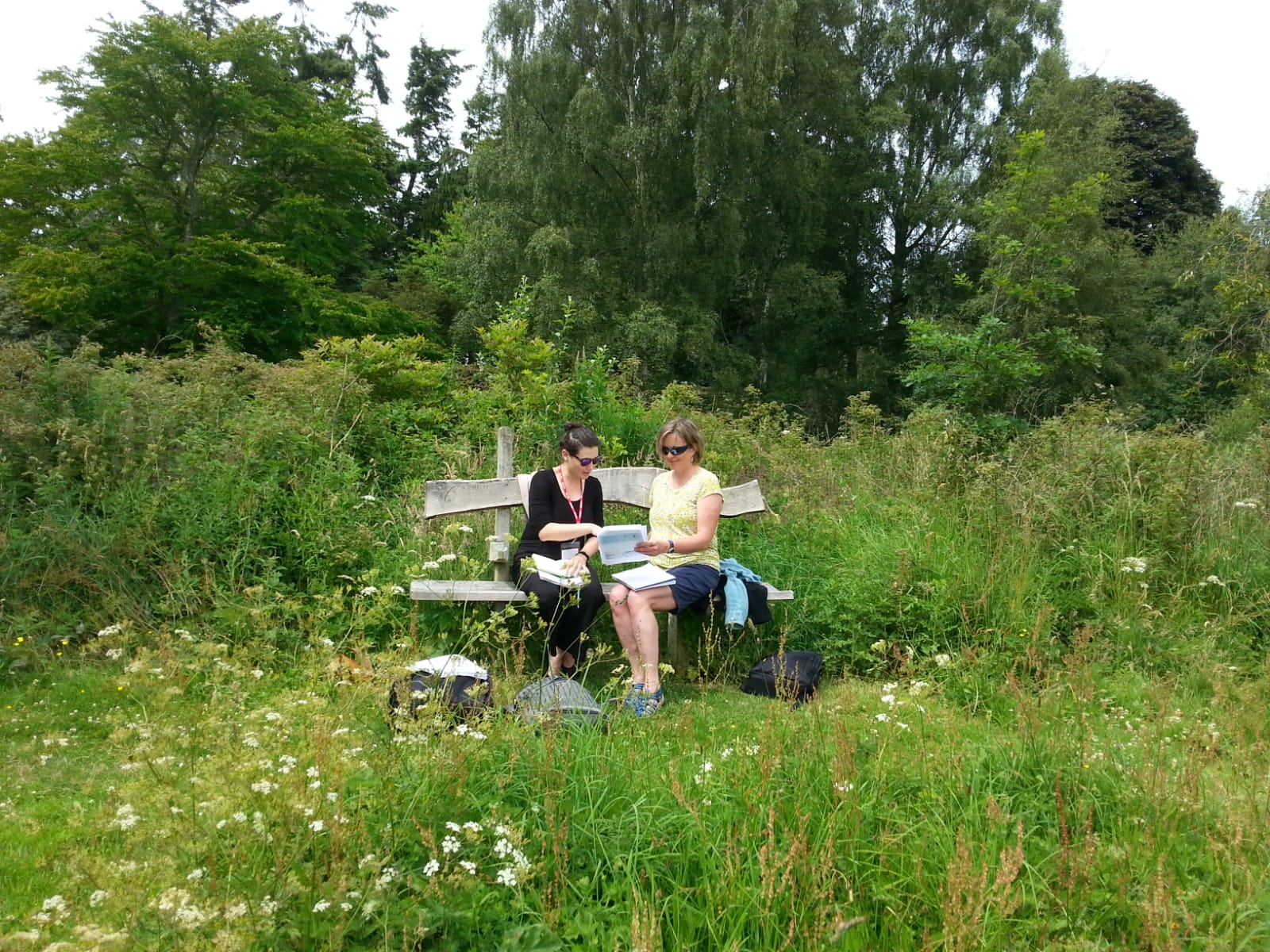
Presenting interview findings to geologist ‘Ness Kirkbride, on the grounds of Scottish Natural Heritage’s Battleby Conference Centre campus.
Credit: Jen Holzer
Besides the long days and beautiful weather, another particularly special aspect of my experience was the nature of the trip itself. I will explain. My host, Dr. Jan Dick, often refers to her leadership of the EU-sponsored OPENness project by saying something like: “It’s the most fantastic thing. I got paid to take the results of our research back to the stakeholders and ask them if they thought it was useful – or to tell us that it’s rubbish. I don’t care if they do think it’s rubbish – I just want to know whether it was useful!” This was also the mandate of my second trip to Scotland. My PhD research is an evaluation of LTSER platforms in Europe; in particular, the following questions:
- Are social questions being integrated into ecological science?
- Is it stakeholder-driven science?
- Is there evidence of impacts?
- Is there added value to this approach?
- What are the challenges?
One of the novel aspects of this project is that it evaluates research that aims to be transdisciplinary, which means that it attempts to integrate different disciplines, diverse researchers and practitioners, and their varied types of knowledge, and then to make that research directly applicable to the policy and practice of environmental management. So, as outlined in our evaluation approach (Holzer et al. 2018), we believe an essential part of evaluating transdisciplinary research (or research that aims to be transdisciplinary) is to take the evaluation results back to the potential end-users of that knowledge (before publishing) and getting their validation and/or criticism, and to incorporate that into the final results.
For the most part, the co-directors of the Cairngorms LTSER did validate our findings, which was affirming in that it meant that our interviewees had corroborated perceptions of local experts, and that on the whole, we had synthesized the interview material to accurately represent the big picture. However, what was perhaps more interesting came up when Dr. Jan Dick turned to me on the way to the LTSER co-directors’ meeting and said, “I’m using you as a boundary object!” A boundary object is any tangible thing – usually a map, graphic, or document — that a group of people, especially people with varied backgrounds and interests, can use as a focal point for their meeting, and to help keep the conversation constructive despite different points of view and reasons for being at the meeting. I realized that while I had been focused on getting feedback on my results, if another important goal was to contribute something to the platform itself, then my visit did inherently give something back in that it provided a clear focus – and perhaps even inspiration — at the LTSER co-directors’ meeting, which was convened because of my visit. To put it bluntly, bringing a visitor from abroad may create an excuse for doing certain things!
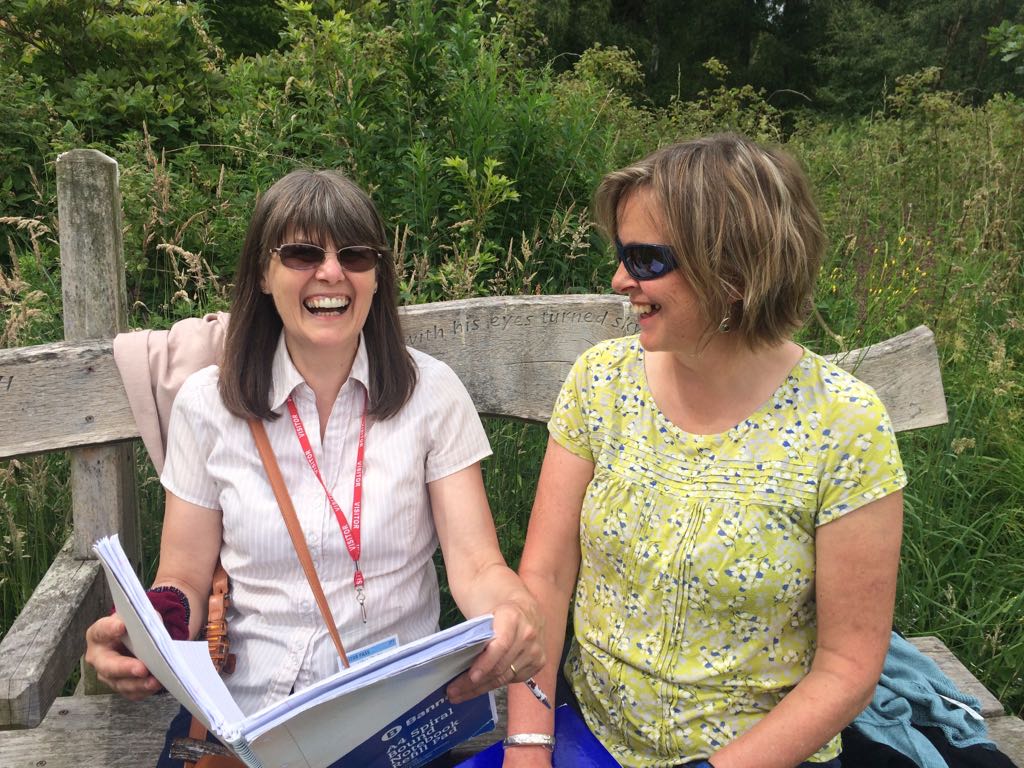
My trip provided an opportunity for Dr. Jan Dick to catch up with her Environmental Change Network colleague ‘Ness Kirkbride.
Credit: Jen Holzer
I have read many accounts of scientists and creatives getting their best ideas while walking, swimming, or sleeping. On this trip, ideas really came together for the paper we hope to co-author with LTSER co-directors when we brought a laptop along to an outdoor café for lunch. If I had to be honest, I would tell you that I’m an introvert, and spending many of my hours manning the helm of my computer is a perk of doing a PhD. But I will also be the first to say that while good ideas may start with a solitary stroll or laps in the pool, they get developed in conversation, all the better if that conversation can take place somewhere beautiful.
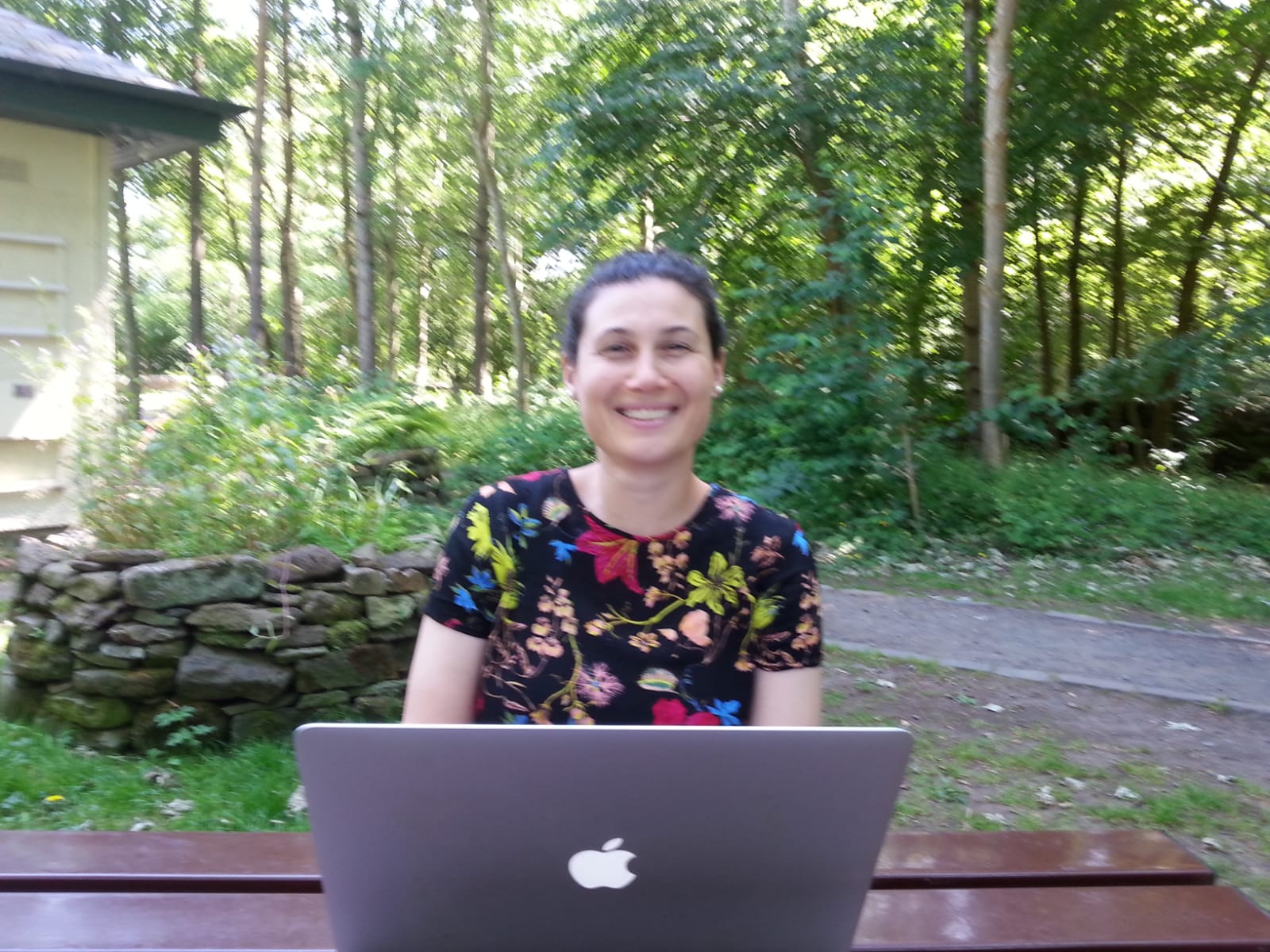
Outlining a manuscript at the café in Pentland Hills Regional Park.
Credit: Jen Holzer
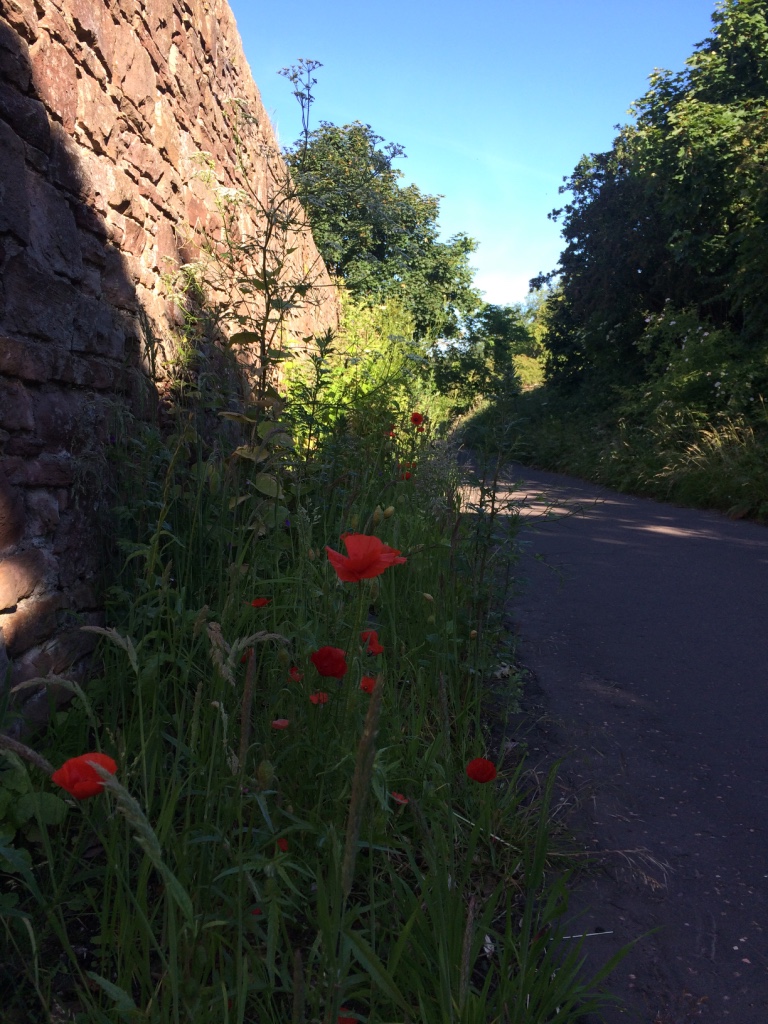
A morning jog on the Muir Way near Holyrood Park in Edinburgh.
Credit: Jen Holzer
It was a productive and engaging trip, with perks like staying minutes from Edinburgh’s Holyrood Park, getting to work outdoors, and opportunities to socialize with scientists – like at the ESCom Conference where I had the opportunity to present a flash talk. Now that I’m back in Israel, I’m ready to write the great next pop song longing for another summer in Scotland.
About the Author:

Jen is a PhD candidate in the Technion Socio-Ecological Research Group in Haifa, Israel. Her research evaluates impacts of the transition in ecological research toward transdisciplinary socio-ecological research. Her trip to Scotland was funded by an eLTER Transnational Access research exchange grant. She is happy to receive your comments, questions, and feedback at jholzer@technion.ac.il.
If you would like to be interviewed by Jen’s colleague Yael Teff-Seker, who will be conducting walking interviews in the Cairngorms National Park in July 2018, please be in touch.










